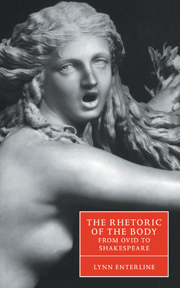Book contents
- Frontmatter
- Contents
- Acknowledgements
- 1 Pursuing Daphne
- 2 Medusa's mouth: body and voice in the Metamorphoses
- 3 Embodied voices: autobiography and fetishism in the Rime Sparse
- 4 “Be not obsceane though wanton”: Marston's Metamorphosis of Pigmalions Image
- 5 “Poor instruments” and unspeakable events in The Rape of Lucrece
- 6 “Your speak a language that I understand not”: the rhetoric of animation in The Winter's Tale
- Notes
- Index
- Cambridge Studies in Renaissance Literature and Culture
5 - “Poor instruments” and unspeakable events in The Rape of Lucrece
Published online by Cambridge University Press: 22 September 2009
- Frontmatter
- Contents
- Acknowledgements
- 1 Pursuing Daphne
- 2 Medusa's mouth: body and voice in the Metamorphoses
- 3 Embodied voices: autobiography and fetishism in the Rime Sparse
- 4 “Be not obsceane though wanton”: Marston's Metamorphosis of Pigmalions Image
- 5 “Poor instruments” and unspeakable events in The Rape of Lucrece
- 6 “Your speak a language that I understand not”: the rhetoric of animation in The Winter's Tale
- Notes
- Index
- Cambridge Studies in Renaissance Literature and Culture
Summary
Stony ladies
In moving from The Metamorphosis of Pigmalions Image to its near contemporary, The Rape of Lucrece, we are turning our attention to another Elizabethan epyllion in which Ovid's embodied voices are integral to a critique of the unspoken assumptions behind Petrarchan convention. But there are profound differences between the way Marston and Shakespeare juxtapose Ovidian and Petrarchan rhetoric. A sense of these will allow us a better grasp of the local, contemporary inflections that shape the sexual politics of The Rape of Lucrece. And it is, of course, precisely the sexual politics of Lucrece that have been the subject of much debate: critics have argued, in various ways, that the deeply entangled issues of rape, subjectivity, and rhetoric in Shakespeare's epyllion pose particularly vexing problems for readers, problems that call upon both critical and ethical judgment. The map one draws of Lucrece's literary affiliations and context will therefore be a matter of no small importance, particularly since the issues that most trouble the poem's recent readers – rhetoric, rape, subjectivity, and the female voice – are, as we have seen, central to the Ovidian legacy that informs it. But before we can analyze how Shakespeare engages with this longer legacy in the voice of his Lucrece, or what difference his revisions make to our reading of the poem's sexual politics, it will be helpful first to narrow the focus briefly by comparing the symbolic and libidinal economy of The Rape of Lucrece to that of Marston's epyllion.
- Type
- Chapter
- Information
- The Rhetoric of the Body from Ovid to Shakespeare , pp. 152 - 197Publisher: Cambridge University PressPrint publication year: 2000
- 1
- Cited by

